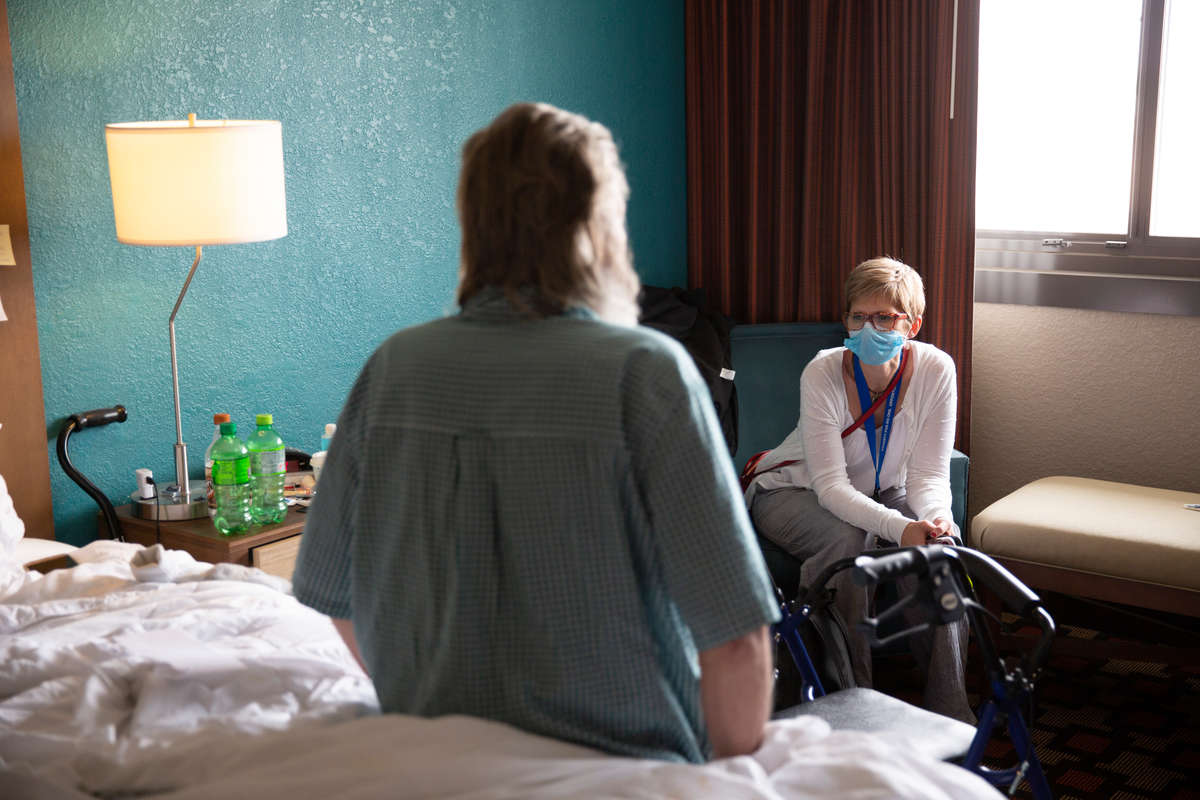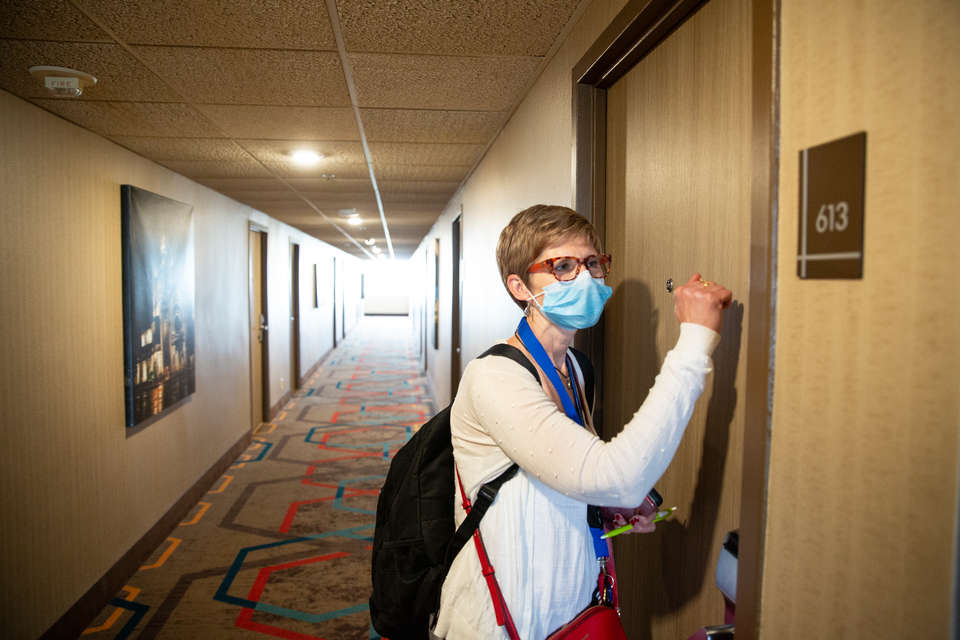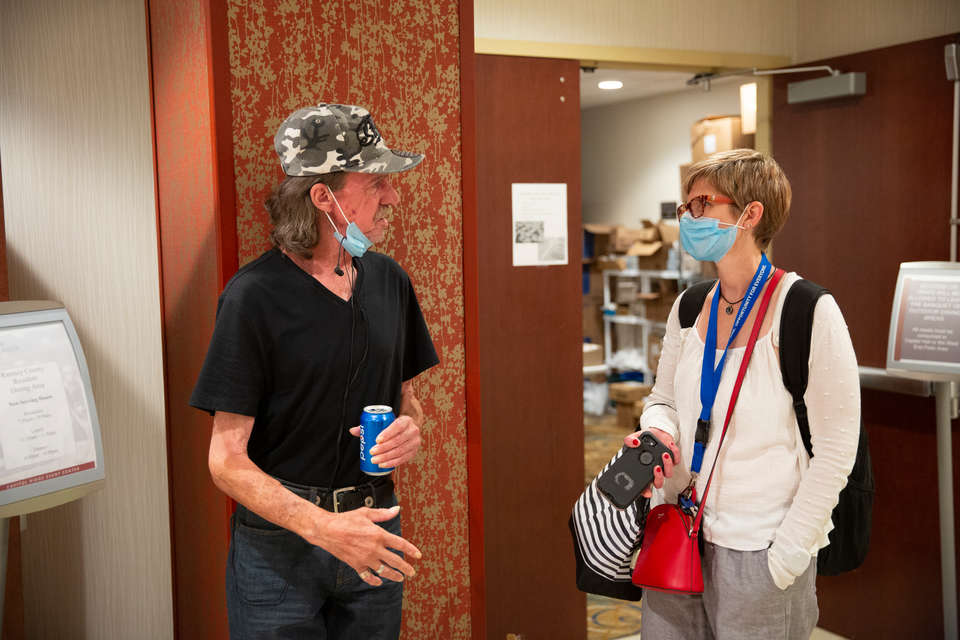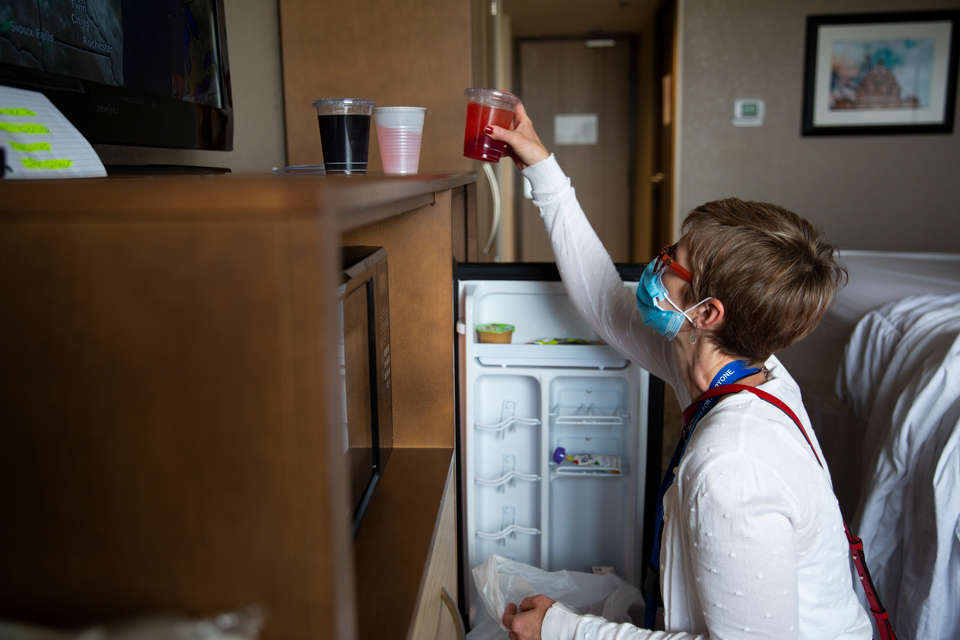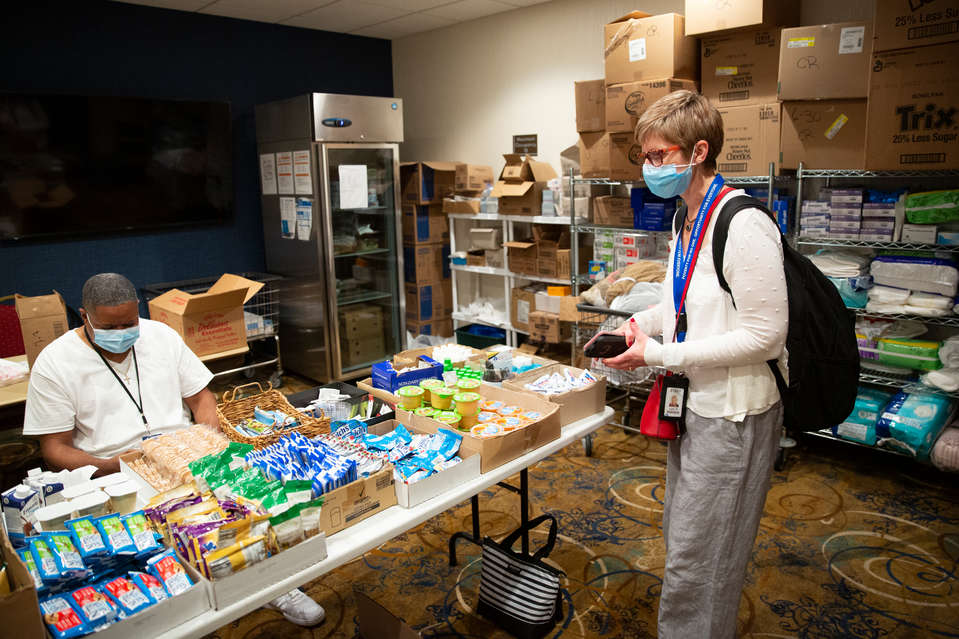ONLINE MAGAZINE EXCLUSIVE
As the United States population ages, the need for skilled social workers is on the rise.
When Annie Myers started an internship last year with Catholic Charities of St. Paul and Minneapolis, she quickly had to confront her biases. During her first month working with the organization’s Homeless Elders program, she heard one of the clients had turned down a housing opportunity. At first, she was confused and thought, "Why wouldn’t anyone who was homeless jump at an opportunity for housing?" But by shadowing Catholic Charities case managers and through self-reflection, she quickly became more understanding.
"I thought about when I was apartment hunting,” said Myers, who graduated in May with a master’s degree from the Morrison Family College of Health’s School of Social Work. “I didn't take the first one that came up, so why should I hold my clients to a different standard?
“Working at Catholic Charities has really taught me how important self-determination is; and allowing people to make decisions for themselves,” Myers continued. “I started to look at my working relationship with clients in terms of what would help support them. What would help a client become housing ready if they weren’t yet? That was a huge learning experience for me. It's understanding that deeply rooted trauma and shame sometimes affect the way our clients make decisions. Society can interpret that as lack of motivation or resistance. I’ve worked with clients that made decisions that I’ve questioned in my head, but it really stems back to their lived experience and the way they view the world.
“With that said,” she added, “I think understanding our client’s worldview cannot happen until we also understand the systemic and racial inequities that contribute to disparate numbers of Black Americans experiencing homelessness.”
For the 2020-21 school year, Myers worked in person alongside Lori Halbur '12 MSW, who has been with the Homeless Elders program for five years.
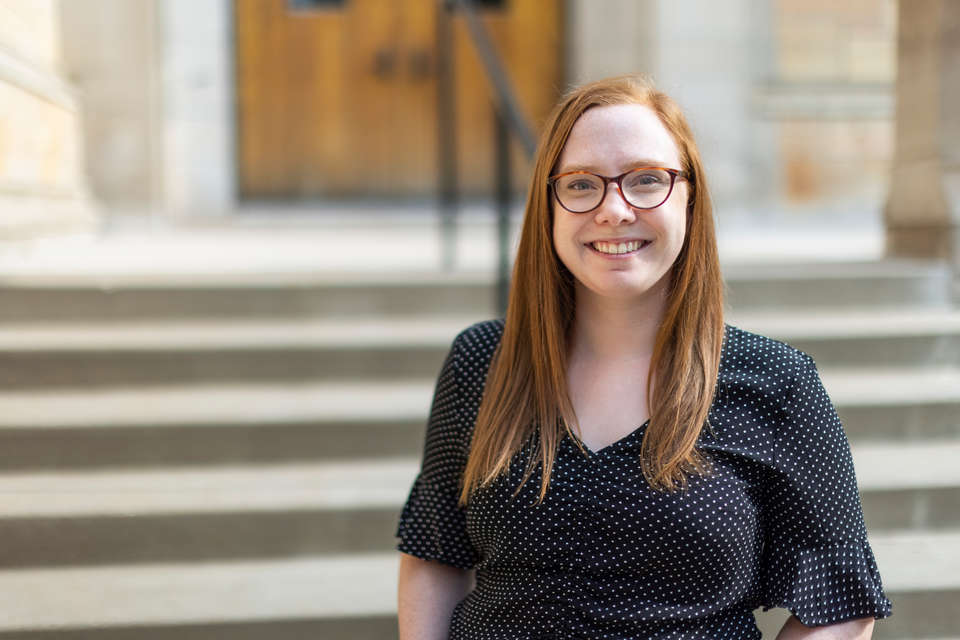
At the beginning of the pandemic, Halbur and her team moved older adults from a group shelter into a hotel setting.
No matter their background, everyone deserves a home, she said.
“We are all just one crisis away from homelessness,” Halbur said. “It doesn't matter how much money you have; it doesn't matter if you own your own home, it doesn't matter if you had a really good job – we are all one really major traumatic crisis away from it. I know that because I've seen it happen. We are seeing more older adults than ever who are homeless for the first time.”
A growing population
Nearly 20,000 Minnesotans were homeless on any given night in 2018, according to the last study conducted by the Wilder Foundation. That same study showed a 25% increase in older adults (55+) experiencing homelessness in Minnesota, making them the fastest-growing segment of the homeless population.
It’s projected that in less than a decade one in five United States residents will be of retirement age (U.S. Census Projections, 2017). And according to the Minnesota State Demographic Center, the number of Minnesotans turning 65 in the current decade will be greater than the past 40 years combined. This population is also expected to overtake the population of those ages 5-18. The U.S. Administration on Aging found that the 85 and older population is projected to more than double from 6.5 million in 2018 to 14.4 million in 2040 (a 123% increase).
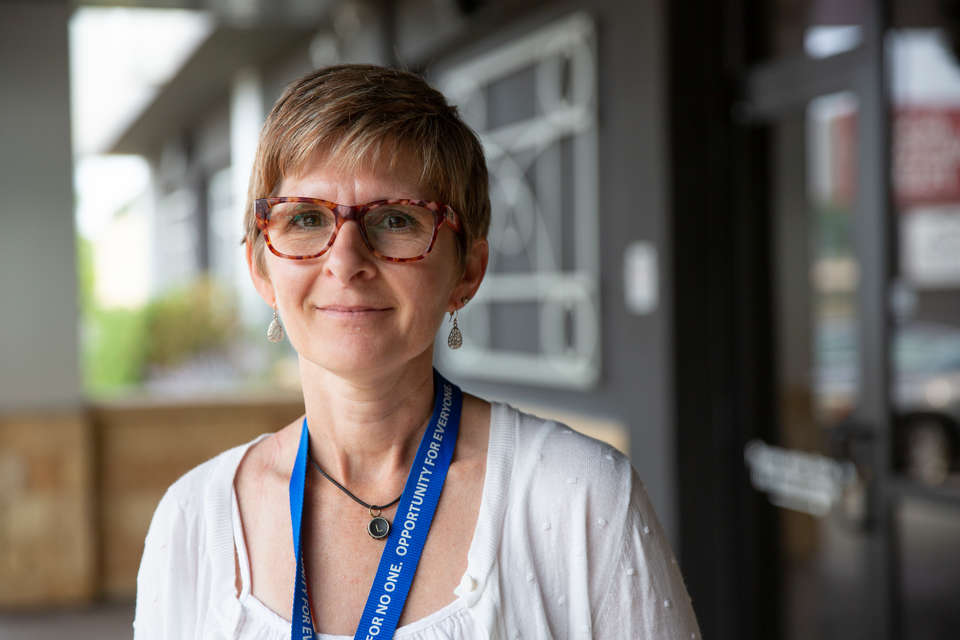
What this boils down to is a great need for social workers who are interested and prepared to work with older adults and their families.
For both Myers and Halbur, strong relationships with their grandmothers fueled an interest in the area of aging. Halbur had an undergraduate degree in social work and had been working with adults with developmental disabilities for nearly two decades before deciding to get her master’s degree. While working on her master’s degree, she interned with Catholic Charities, which turned into a job once she graduated.
“Workforce development in this area of practice is vital; while we have a group of very dedicated students interested in clinical social work practice with older adults, we need so many more,” said Tanya Rand, a School of Social Work clinical faculty member and coordinator of aging services who oversees the school's Area of Emphasis in Aging (AEA) program. (The school also offers two additional areas of emphasis, including military practice and practice with immigrants and refugees.) During her time in the program, Myers was an AEA scholar focused on Gero-Social Work Practice, an area of clinical practice working with older adults and their families.
“There are specialized areas within practice with older adults that our students can focus on such as healthy aging, wellness, supportive transitions, grief and loss, chronic illness management, and coping with social isolation,” Rand said. “We need to have students who both want to and who are prepared to work with older adults and their families during this phase of the lifespan. This is a very rewarding area of clinical social work practice, and with the AEA Program students can gain the valuable skills and competencies needed to be successful in this field of practice.
“The students we’re seeing are passionate, they want to focus on micro to macro levels of practice,” continued Rand, who noted an increase in students from greater Minnesota interested in the AEA. “We have some students who graduate and go on to work in agencies that support policy, program administration and advocacy for older adults. Some students work in a geriatric behavioral health care unit in a hospital, and some are in hospitals providing care coordination. We have other students working in hospice and palliative care. There are some providing psychoeducation, counseling, and other mental health services either in a client's home or at a long-term care facility. There are also some students who go on to provide supportive services and community outreach at places like Catholic Charities' Homeless Elders program.”
From shelter to hotel
When the pandemic hit, it was clear that older adults who were homeless – many of whom have comorbidities – needed different accommodations than group shelters provided. Dealing with a population that is particularly vulnerable to COVID-19, it was important for Halbur and her colleagues to find a safe space for their clients. At the end of March 2020, Catholic Charities, along with a variety of partners, including Ramsey County, acted quickly and were able to find shelter for 60 people over the age of 60 at a St. Paul hotel, funded by the county. As of August 2021, there were 125 homeless individuals staying at the hotel.
"Older adults have many health and mobility vulnerabilities,” Halbur said. "What do you do if you're on oxygen? Where do you plug that in? They have medications that sometimes get stolen in a group shelter. Showering takes longer. Lines are too long for them to stand in. In the hotel things are much easier to deal with. They have rooms that lock, and they have their own bathrooms.
“Ramsey County is focusing on how to help house homeless people,” she continued. “The county understands what a huge problem it is and is really learning what those barriers are for a lot of our clients to getting a home of their own.”
Ramsey County has signed a contract through May 2022 to keep the hotel open for older adults, Halbur said.
“Hotel shelter is a much more dignified way of living,” said Myers. “It helps motivate clients to work with Catholic Charities to find housing opportunities. It’s a lot easier for clients to fill out a housing application with a social worker when they aren’t worrying about whether or not they get a shelter bed that night.”
Along with being on-site at the hotel, Myers worked on many of the tasks that case managers handle, which included providing psychosocial support and helping clients complete housing applications. She assisted one client with moving into a new home, went grocery shopping with them and helped them find support systems in their new community.
“When he moved into his apartment, he kissed the stove,” she said. “It was a really heartwarming moment – he said he was home.”
As Myers begins a new job as a licensed psychotherapist with M Health Fairview in its Adult Mental Outpatient programs specifically working with those 55 and older, she’ll take with her many lessons learned working at Catholic Charities including meeting clients where they are in life as far as needs are concerned.
“I tend to go into problem-solving mode right away – I'm more task oriented,” Myers said. “And this experience allowed me to step back and listen to the clients. And especially with older adults, they have amazing stories.”
The ultimate goal is to find older adults who are homeless a place to live, but there’s much more to their work, Halbur said.
“It’s not our job to put somebody where they don't want to be – it is their life and their choice,” she said. “Our job is to listen.”
